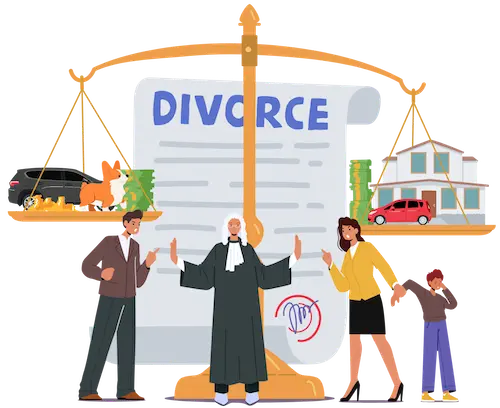Discover more. If your divorce is inevitable, choose the BETTER Path: join our newsletter for supportive, resolution-focused information!
How Flat Fee Divorce Works
- Home
- Our Services
- Flat Fees
What is flat fee divorce?
A flat fee divorce is a type of divorce arrangement where a lawyer charges a fixed amount for filing and obtaining your divorce order, which is an order of the court.
If your separation is uncontested it may be possible to save quite a bit of money!

This is quite different to an hourly billing method, where you are charged based on the lawyer and support team's time spent on your matter.
Quite often a flat fee divorce lawyer will offer a flat fee legal service but there are all sorts of hidden costs. Suddenly you can find you are paying extra expenses which you had not expected.
However, the good news is that at Pathway Legal we are transparent about our billing practices and we know that our clients love that about us.
We also know that, whether you are based in Kamloops, Nanaimo, Langley or any of the surrounding areas, you will love the predictability of flat fees for legal services. That is why we offer flat fees whenever we can. 😊
What Does Pathway Legal Charge for an uncontested divorce?
At Pathway Legal, we offer a Flat Fee Structure in many instances, depending on your circumstances.
A word of caution:
A flat fee divorce is a fit for some folks but not others. It depends on your circumstances. If it works for you, a flat fee structure is a win-win for you, the client, and your lawyer because you get to know exactly how much your legal fees will be at the outset.
For the lawyer, it is also beneficial because they can leverage their expertise and efficiencies in such a way that helps your case.
Imagine knowing EXACTLY how much your divorce order is going to cost BEFORE you get start!
The Pathway Legal Services
We offer flat fees for the following services:
- Drafting your legally binding agreement:
Separation Agreement, Cohabitation (i.e. Marriage Agreement), Prenuptial Agreement Read more... - Your Uncontested Divorce:
(This may be the ideal situation for you if your divorce is uncontested). - Independent Legal Advice:
(Essential for reviewing an agreement prepared by another party or lawyer)
Note: Flat fees for a divorce, separation agreement, independent legal advice, and other agreements only apply if you have already reached an agreement. Flat fees are not applicable if you are still in the negotiation process.

Need a DeepER Dive?
- Discover the average cost of divorce mediation, a divorce lawyer and who pays for divorce
- Are you part of a high net worth divorce? Pathway Legal has the lawyers to help.
Video: Why We offer flat fee divorces
FAQ: What is the cost of a Flat fee divorce at Pathway Legal?

At Pathway Legal, the flat fee cost for an uncontested divorce is $3,456.25. This includes legal fees, disbursements, and taxes for a legally binding separation agreement. You need to discuss your matter with your Pathway lawyer at the first appointment so we know all the facts of your situation. Continue following this FAQ more more details.
What are the details of the flat fee divorce at Pathway Legal?
What are the details of the flat fee divorce at Pathway Legal?
- $2,500; Legal service.
- $125; Divorce Mate software fee.
- $95; Cloud (encrypted and secure) storage and administration fee.
- $210; Court Filing Fee
- $25; Agency fees and/or CSO. We utilize court agents that we have worked with for almost 30 years. They stand in line at the courthouse and file documents, so you don’t have to pay your lawyer or our support staff to do it.
- $150; Service of documents.
- $20; Printing, scanning, photocopies.
- $125; GST on legal fees.
- $175; PST on legal fees.
- $13.25; GST on disbursements.
The breakdown includes:
Requirements
Requirements
- Accurately fill out the firm intake form in its electronic format.
- Provide your Pathway Legal lawyer with a written-out draft of your proposed agreement.
- In addition to your initial consultation, you agree to meet with your Pathway Legal lawyer up to two further instances to review and confirm the terms of the agreement, or document that is to be prepared.
- Fully and accurately fill out the asset and debt section of the financial statement form (with your paralegal's assistance if you wish).
Inclusions
Inclusions
- legal services for the purpose of drafting a comprehensive and legally binding separation agreement, which will address matters such as the division of your assets, your parenting plan, child support, spousal support, conduct, and any other relevant matter arising from your separation. For more on these subjects, please visit our Divorce with Children and Spousal Support sections.
- up to two (2) one-hour meetings with your Pathway Legal lawyer.
- an overview of the law as it relates to you and your unique circumstances.
- legal advice associated with your planned agreement, so you clearly understand your rights and responsibilities.
- prepare the agreement based on your instructions.
- communicate with opposing counsel or party, for up to 30 minutes. Your lawyer will make reasonable agreed-upon changes to the agreement in consultation with the other party, their lawyer, and you.
- attend with you to execute the agreement once finalized.
- execute the Certificate of Independent Legal Advice appended to your agreement.
How to save extra money
How to save extra money
- Family court divorce filing fee:
In the fees outlined above, you will see the family court divorce filing fee of $210. If we use BCRegistery.gov.ca (this was previously known as BC Online) to file documents, it is $7 per submission.
Although we can’t avoid the expense of the family court divorce filing fee, we do try to save disbursements (also known as out-of-pocket expenses), in other ways. For example, if your ex is cooperative, they can come to our office in Victoria, B.C. to be served rather than us hiring a process server. These savings are passed on to you! 😊 - EAP clients:
Clients who are a part of the Employee Assistance Program, receive a 25% discount on the legal fee. So, instead of the legal fee component being $2500, it would be $1875. - Prior Pathway clients also receive a 25% discount.
- EAP client AND an existing Pathway client:
You receive another 25% off the legal fees. So a whopping 50% discount on the legal fees making it $1250, instead of $2,500.
What can add extra, unexpected costs?
What can add extra, unexpected costs?
If your matter becomes complicated (e.g., if your ex does not co-operate), additional fees will apply for your lawyer’s time billed at their hourly rate. You will always need to discuss the fee structure at your initial visit with your lawyer and the fee structure will be laid out for you in writing before commencing the next steps.
Summary of flat fee divorce
When you anticipate that your divorce will be uncontested, a flat fee divorce will likely suit you and your situation. Chat with one of the Pathway Legal lawyers, and we will take a look at your circumstances.








